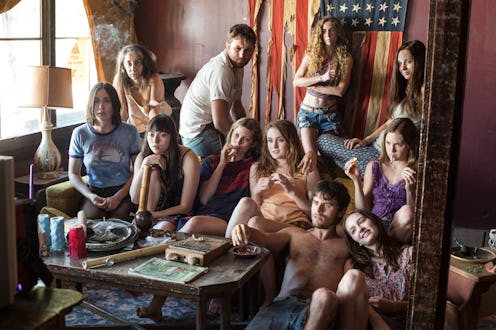Entertainment
'Manson's Lost Girls' Covers An Infamous Case

It's been nearly 50 years since the infamous Tate-LaBianca murders, but Charles Manson and his followers continue to intrigue many people. In 2013, Jeff Guinn published a 500-page biography entitled Manson: The Life and Times of Charles Manson. Last summer, NBC tackled the topic with its drama Aquarius. And, on Feb. 6, Lifetime will premiere its film version of the events — but, instead of spotlighting Manson himself, it will focus on the young women who followed him and joined the Manson "family." Since shows like Aquarius have openly used a great deal of artistic license, I'm already curious if Manson's Lost Girls is accurate to the real-life case. Bustle spoke to director Leslie Libman about the film and emphasizes its focus on accuracy. "I’d have to break it down character by character," she says. "Some of the characters are composite. But everything in the film happened. Everything that is portrayed there — we took a little bit of license."
Here's the synopsis from Lifetime's official website:
Manson’s Lost Girls follows Linda as she first arrives at the seemingly idyllic Spahn Ranch hippie commune where she is embraced with open arms. Seduced by the group’s free-love lifestyle, Linda revels in the sisterhood and acceptance. Taken with Manson, he soon draws her into criminal activities, including late-night “creepy crawls” to steal from lavish homes. Linda reluctantly becomes an accomplice in Manson’s “Helter Skelter,” a drug-fueled murder spree that included the brutal death of actress Sharon Tate. She ultimately breaks away and turns herself in as a witness for the prosecution and helps to convict Manson.... With original 1960's music from iconic bands such as Donovan, The Turtles and CCR, the film captures the bohemian clothing, hairstyles and makeup of the time.
The clear focus of the movie will be Linda Kasabian, who acted as the driver and lookout on the nights of the murders in August 1969, according to CBS News. Prosecutor Vincent Bugliosi granted her immunity in exchange for her testimony against Manson, and therefore Kasabian herself was never charged as an accomplice in the killings, CBS News further reported. In 2009, The Guardian reported that Kasabian agreed to be interviewed by Nick Godwin for his TV documentary, Manson. At the time of Manson's release, she also participated in an interview with Larry King — but she did so in disguise in order to protect her privacy and safety.
Since Kasabian's engagement with the media has been so minimal, it tends to be big news when she does agree to an interview — so it's unlikely she was involved in the production of Manson's Lost Girls. However, The Day reported in 1970 that Kasabian spent 18 days on the witness stand detailing her experience with the Manson cult and what exactly transpired on the nights of the Tate-LaBianca murders. Excerpts of Kasabian's testimony are readily available online and the few interviews she's given have provided a lot of information — so filmmakers had plenty of resources at their disposal in order to make Manson's Lost Girls as accurate as possible. And, the director tells Bustle she did use every available resource:
Every single book that’s been written, including Helter Skelter [by case prosecuter Vincent Bugliosi], was used. Every documentary that’s been made. One that was particularly enlightening was a documentary called Manson, which you can’t see on YouTube, you have to order it, and it’s actually got film footage that they took at the ranch before everybody was arrested and after, so there’s a lot of Squeaky Fromme in there ... So, there’s a lot of interviews with people who heard the story from Susan Atkins in prison, and also who visited the ranch. The stories were a hundred times more horrific than anyone’s ever heard, and it would be very hard to put all of that into one 90 minute film, but it’s more of a distillation of what was reported and what’s in the news and what’s documented.
Since Lifetime is marketing the film as a true story and since it's a sensitive topic, it seems as though the filmmakers had the tools to present the story as accurately as possible. Artistic license will probably come into play in the exploration of the relationships between Manson's followers — star Greer Grammer (who plays Leslie Van Houten) told Gotham that the film "really focuses on who the girls were together in relation to Charlie but also in relation to each other, and I think that’s a different side to the story that we’ve never seen."
In the same interview, Grammer confirmed that none of the stars spoke with former Manson Family Members because they're all either incarcerated, in hiding, or not open to additional interviews. So, although the Tate-LaBianca murders and the trial scenes will probably be realistic, viewers might want to take the personal interactions between the characters with a grain of salt.
Images: Jack Zeman (2), James Dittiger, Jim Fiscus/Lifetime